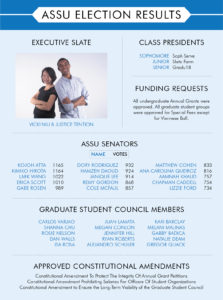
The results of the 2017 ASSU elections were announced Saturday afternoon on the ASSU Elections Commission’s website. Voter turnout rates for undergraduate and graduate students were 55.49 percent and 29.80 percent, respectively, with a total rate of 40.42 percent across the entire student body.
Justice Tention ’18 and Vicki Niu ’18 were elected as the 2017-2018 ASSU Executives with 1,374 votes; the count reflects the number of people who ranked Tention and Niu first on the ballot. In second place were Khaled Aounallah ’19 and Michael Ocon ’20 with 1,081 votes, while Sean Means ’18 and Pablo Lozano ’18 came in third with 1,042. A joke slate consisting of Jason Seter ’18 and Deedee Anderson ’19 received 743 votes.
Throughout their campaign, Tention and Niu focused on “experience, compassion and connection,” according to their platform. They advocated for adopting sanctuary campus status, restoring funding to cultural community centers, increasing the availability of mental health services on campus and fighting sexual violence through Title IX reform, among other goals.
The following candidates were elected to the 19th Undergraduate Senate, in descending order of votes: Kojoh Atta ’20, Kimiko Hirota ’20, Lark Wang ’20, Erica Scott ’20, Gabe Rosen ’19, Doris “Dory” Rodriguez ’20, Hamzeh Daoud ’20, Janique Lee ’20, Remy Gordon ’20, Cole McFaul ’20, Matthew Cohen ’18, Ana Carolina Queiroz ’20, Aamnah Khalid ’20, Chapman Caddell ’20 and Katie Hufker ’18.
This year, students voted on four amendments to the ASSU Constitution, three of which were passed. The first passed amendment prohibits officer salaries for student groups. Another will increase funding for the Graduate Student Council (GSC) by raising graduate student fees. The final amendment is concerned with protecting “the integrity of Annual Grant petitions” amid the controversy of last month’s Constitutional Council case, which Band and KZSU won against the Senate. The amendment prevents student groups from putting funding they did not initially request into their annual petition budgets.
An amendment that would have prohibited student fees going toward items that do not comply with University policy or state or federal law failed to receive enough votes for approval.
The winning sophomore and senior class presidents are Soph Serve and Gradu18, respectively. The junior class slate Slate Farm, which ran unopposed, was also elected.
Fifteen graduate students were elected to the Graduate Student Council (GSC): Carlos Varjao from the Graduate School of Business; Shanna Chu from the School of Earth, Energy and Environmental Sciences; Rosie Nelson from the School of Education; Dan Walls and Isa Rosa M.S. ’16 from the School of Engineering; Juan Lamata from the Humanities; Megan Conlon from Natural Sciences; Jennifer Hill M.A. ’16 from Social Sciences; and Ryan Roberts from the School of Law and Alejandro Schuler from the School of Medicine. Kari Barclay, Melani Malinas, Gabby Badica, Natalie Deam and Gregor Quack were elected at-large.
Finally, all undergraduate student groups who applied for Annual Grants were approved for funding. Every graduate student group was also approved for Special Fees, with the exception of Viennese Ball.
The ASSU sought to increase voter turnout this year by sending each student an individualized ballot link through the survey website Qualtrics. Elections Commissioner Paul Serrato ’19 noted that the voter turnout rate increased “significantly” for graduate students and that overall turnout increased from 33.7 percent to 40.42 percent since last year. However, some students reported issues with their ballots, and the ASSU worked Friday to resolve the issue. Some students remained upset with the process, though, arguing that some early GSC voters did not have enough time to recast their votes after a glitch was fixed.
Contact Celia Chen at xinuo ‘at’ stanford.edu and Sarah Ortlip-Sommers at sortlip ‘at’ stanford.edu.
This post has been updated to reflect comments from Serrato about voter turnout rates.
Update: This post has been further updated with the correct winner for one of the GSC representatives from the School of Engineering, which was incorrect in the results that the Commission initially released. The winners are Dan Walls and Isa Rosa, not Dan Wells and Ruishan Liu.
Update: A previous version of this article mistakenly reported that Lizzie Ford had been elected to the Senate. While Ford received the 15th highest number of votes overall, the Senate consists of three members of the upperclass district and 12 at-large members. Katie Hufker was elected as the third member of the upperclass district.
